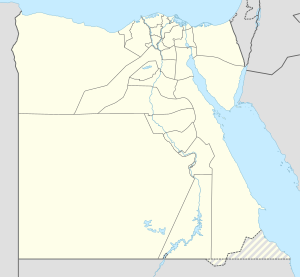Akhmin
|
Akhmim أخميم |
|
|---|---|

Prince Hasan Mosque
|
|
| Location in Egypt | |
| Coordinates: 26°34′N 31°45′E / 26.567°N 31.750°E | |
| Country |
|
| Governorate | Sohag |
| Time zone | EET (UTC+2) |
Akhmim (Egyptian Arabic: أخميم, pronounced [ʔæxˈmiːm]; from Egyptian: Khent-min ; Coptic: Khmin ) is a city in the Sohag Governorate of Upper Egypt. Referred to by the ancient Greeks as Khemmis, Chemmis and Panopolis, it is located on the east bank of the Nile, 4 miles to the northeast of Sohag.
Akhmim was known in Ancient Egypt as Ipu, Apu or Khent-min. It was the capital of the ninth (Chemmite) nome of Upper Egypt. The city is a suggested hometown for Yuya, the official of Tuthmosis IV and Amenhotep III. The ithyphallic Min (whom the Greeks identified with Pan) was worshipped here as "the strong Horus." Herodotus mentions the temple dedicated to Perseus and asserts that Chemmis was remarkable for the celebration of games in honor of that hero, after the manner of the Greeks, at which prizes were given; as a matter of fact some representations are known of Nubians and people of Punt (southern coastal Sudan and the Eritrean coast) clambering up poles before the god Min. Min was especially a god of the desert routes on the east of Egypt, and the trading tribes are likely to have gathered to his festivals for business and pleasure at Coptos (which was really near Neapolis) even more than at Akhmim. Herodotus perhaps confused Coptos with Chemmis. Strabo mentions linen-weaving and stone-cutting as ancient industries of Panopolis, and it is not altogether a coincidence that the cemetery of Akhmim is one of the chief sources of the beautiful textiles of Roman and Christian age, that are brought from Egypt.
...
Wikipedia

